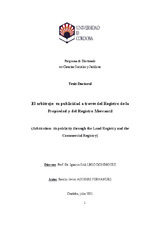Mostrar el registro sencillo del ítem
El arbitraje: su publicidad a través del Registro de la Propiedad y del Registro Mercantil
| dc.contributor.advisor | Gallego Domínguez, Ignacio | |
| dc.contributor.author | Aguirre Fernández, Basilio Javier | |
| dc.date.accessioned | 2022-01-10T09:31:55Z | |
| dc.date.available | 2022-01-10T09:31:55Z | |
| dc.date.issued | 2022 | |
| dc.identifier.uri | http://hdl.handle.net/10396/22256 | |
| dc.description.abstract | El presente estudio trata de analizar todas las conexiones y puntos de contacto que pueden plantearse entre el arbitraje y los Registros de la Propiedad y Mercantil. Después de hacer una breve aproximación al concepto, naturaleza jurídica y encaje constitucional del arbitraje, se aborda todo el proceso arbitral, desde el convenio que firman las partes y por el que deciden someter las futuras controversias a arbitraje, hasta los mecanismos de impugnación del laudo. Así, se estudia la posibilidad y conveniencia de inscribir el convenio en el Registro, los requisitos necesarios para ello y los efectos que dicha inscripción producirá respecto de terceros. Se hace un especial detenimiento en campos en los que la admisibilidad del arbitraje ha sido más discutida, como el societario o el arrendaticio, resaltando las especialidades que podemos encontrar en materias como la sucesoria. Dentro de la fase de desarrollo del procedimiento arbitral, nos detenemos a revisar el proceso de designación de los árbitros, los requisitos que estos deben reunir y la eventual intervención judicial como mecanismo de auxilio en caso de necesidad. También se analiza en esta fase la posibilidad de adoptar medidas cautelares, con especial detenimiento en aquellas que tienen trascendencia registral: las anotaciones preventivas. De igual manera se estudia la finalización del procedimiento arbitral, desgranando de forma pormenorizada los requisitos que ha de cumplir el laudo. A este respecto el trabajo centra su atención en los requisitos de inscripción del laudo. En este apartado se comentan cuestiones que apenas encuentran eco en la legislación, en la jurisprudencia y en la doctrina, tales como si es o no necesario que el laudo se eleve a escritura pública para acceder al Registro, o cuál es el alcance de la calificación registral. Finalmente, también se estudian las posibilidades de revisión del laudo, ya sea a través de la acción de anulación, ya mediante el recurso de revisión. | es_ES |
| dc.description.abstract | This study tries to analyze all the connections and points of contact that may arise between arbitration and the Property and Commercial Registries. After making a brief approach to the concept, legal nature and constitutional framework of arbitration, the entire arbitration process is addressed, from the agreement signed by the parties and by which they decide to submit future disputes to arbitration, to the mechanisms for challenging the award. Thus, the possibility and convenience of registering the agreement in the Registry, the necessary requirements for this and the effects that said registration will produce with respect to third parties are studied. A special detail is made in fields in which the admissibility of arbitration has been more discussed, such as corporate or tenancy, highlighting the specialties that we can find in matters such as succession. Within the development phase of the arbitration procedure, we stop to review the process of appointment of the arbitrators, the requirements that they must meet and the eventual judicial intervention as a mechanism of assistance in case of need. The possibility of adopting precautionary measures is also analyzed in this phase, with special attention to those that have registry significance: preventive annotations. In the same way, the finalization of the arbitration procedure is studied, detailing in detail the requirements that the award must meet. In this regard, the work focuses its attention on the requirements for the registration of the award. This section discusses issues that barely find an echo in the legislation, jurisprudence and doctrine, such as whether or not it is necessary for the award to be raised to a public deed to access the Registry, or what is the scope of the qualification registry. Finally, the possibilities of reviewing the award are also studied, either through the annulment action or through the appeal for review. | es_ES |
| dc.format.mimetype | application/pdf | es_ES |
| dc.language.iso | spa | es_ES |
| dc.publisher | Universidad de Córdoba, UCOPress | es_ES |
| dc.rights | https://creativecommons.org/licenses/by-nc-nd/4.0/ | es_ES |
| dc.subject | Arbitraje | es_ES |
| dc.subject | Árbitros | es_ES |
| dc.subject | Procedimiento arbitral | es_ES |
| dc.subject | Medidas cautelares | es_ES |
| dc.subject | Anotaciones preventivas | es_ES |
| dc.subject | Laudo | es_ES |
| dc.subject | Publicidad registral | es_ES |
| dc.subject | Registro de la Propiedad | es_ES |
| dc.subject | Registro Mercantil | es_ES |
| dc.subject | Derecho registral | es_ES |
| dc.title | El arbitraje: su publicidad a través del Registro de la Propiedad y del Registro Mercantil | es_ES |
| dc.title.alternative | Arbitration: its publicity through the Land Registry and theCommercial Registry | es_ES |
| dc.type | info:eu-repo/semantics/doctoralThesis | es_ES |
| dc.rights.accessRights | info:eu-repo/semantics/openAccess | es_ES |

